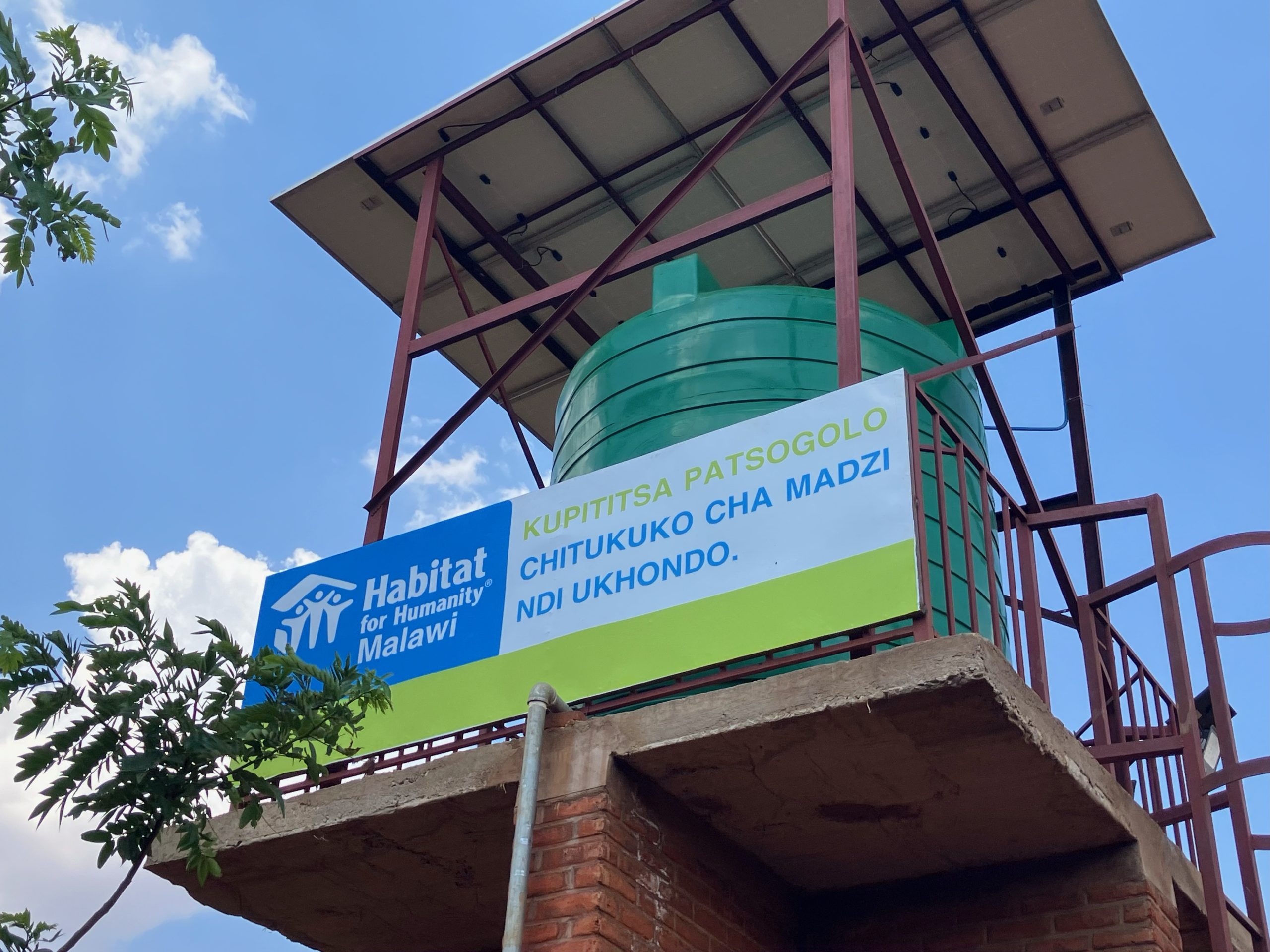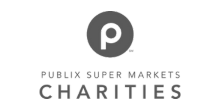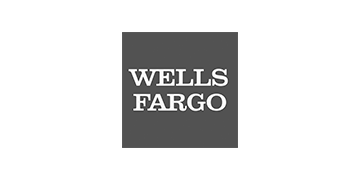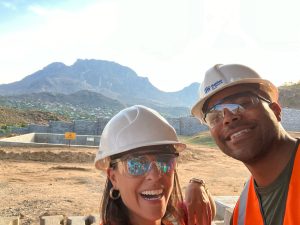
Habitat Global Village Journal: Chris Hackney and Camila Gonzalez
Habitat for Humanity Tampa Bay Gulfside is proud to be represented in Malawi, Africa by Habitat Board Member Chris Hackney and VP of Mortgage Services Camila Gonzalez as they participate in the Habitat for Humanity Global Village trip to Habitat for Humanity Malawi. Read about their experiences as they provide daily journal updates.
Habitat for Humanity Malwai Trip 2024
Entry #1 – Tuesday, October 22nd – Area 27, Sector 3
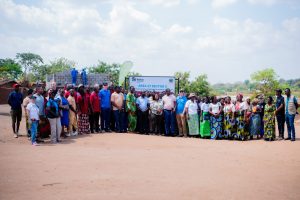 Today, we visited an informal settlement known as Area 27, Sector 3. The challenges faced by the residents are stark; they lack access to basic housing, utility services, and safe roads. Living in close proximity to industrial areas creates a constant fear of eviction, as larger organizations may seek to “buy them out.”
Today, we visited an informal settlement known as Area 27, Sector 3. The challenges faced by the residents are stark; they lack access to basic housing, utility services, and safe roads. Living in close proximity to industrial areas creates a constant fear of eviction, as larger organizations may seek to “buy them out.” 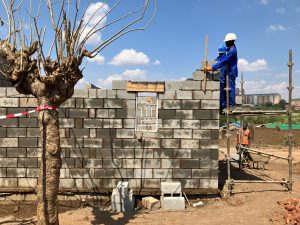
Despite these hardships, there are significant initiatives underway. Housing improvements can lead to enhanced education and economic benefits for the community. One standout initiative is the empowerment of women through land ownership and savings programs. A group of women has established a savings initiative aimed at affording better homes or necessary repairs. This program has the potential to impact 321 women, providing them with a pathway to improved housing stability.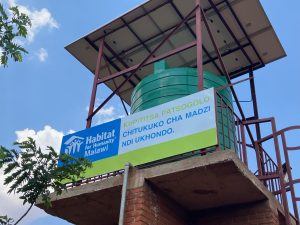
Additionally, the youth are being mobilized to participate in urban planning, ensuring they have a voice in responsible community interventions. So far, 13 families have directly benefited from habitat builds, and although water access remains a challenge—with only two spots for piped water and no well water available—the community is hopeful. Roads and drainage systems are set to be completed by next year, which will allow some families to undertake improvements to their homes independently.
This two-year project, initiated in April last year, is making strides. The affiliate organization is also working on a water sanitation and hygiene project for schools in both the Cholo southern region and the western region.
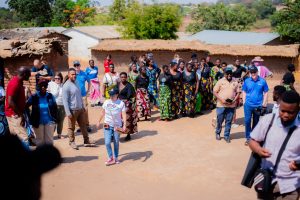 An impressive aspect of the project is how Habitat manages groundwater sustainably. A central groundwater system, accessible via water stations throughout the village, has been established, which includes a solar-powered well serving over 2,000 residents. The well’s construction cost around €29,000, a worthwhile investment for the community.
An impressive aspect of the project is how Habitat manages groundwater sustainably. A central groundwater system, accessible via water stations throughout the village, has been established, which includes a solar-powered well serving over 2,000 residents. The well’s construction cost around €29,000, a worthwhile investment for the community.
Moreover, the residents are embracing sustainable cooking methods, like brick-making from recycled paper, which provides a healthier alternative to the harmful charcoal they used a decade ago.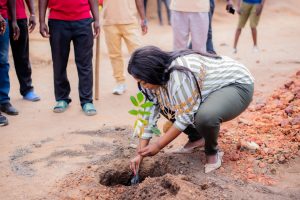
Today’s visit reminded me of the resilience and determination of communities in the face of adversity. There is hope for improvement, and it’s inspiring to see how these initiatives can bring about meaningful change.
Excited to report back tomorrow! -Chris and Camila
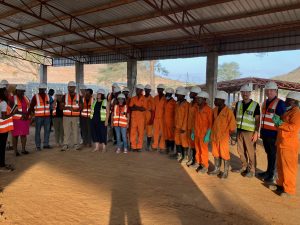 Our adventure began bright and early at 8 AM as we set off for Blantyre, a city rich in culture and innovation. Our first stop was a delightful pottery shop in Dedza, where the team had the perfect opportunity to pick up some unique souvenirs. It was a charming way to kick off our journey!
Our adventure began bright and early at 8 AM as we set off for Blantyre, a city rich in culture and innovation. Our first stop was a delightful pottery shop in Dedza, where the team had the perfect opportunity to pick up some unique souvenirs. It was a charming way to kick off our journey!
On our way, we made a quick detour to savor some fresh peaches from Mozambique, just across the street from Malawi. The sweet, juicy fruit was a refreshing treat that energized us for the day ahead.
Later in the day, we had the privilege of visiting Habitat’s Soil Stabilizer Block (SSB) factory. This facility represents Malawi’s innovative response to a government ban on cured bricks, which traditionally required cutting down trees for the curing process. The SSB technology not only promotes sustainability but also increases accessibility to essential construction materials. 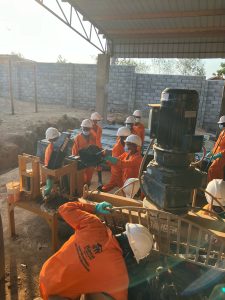
The project, which started in 2022 and is set to conclude in June 2025, is making strides in the local community. It also serves as a training site for vulnerable youth, equipping them with vital vocational skills while raising awareness about sustainable construction practices.
During our visit, we met Peter from Habitat Malawi’s Blantyre office. He runs the enterprise and shared insights into their operations. The factory is equipped with two machines: one produces both small and large blocks, as well as interlocking pavers, while the other focuses exclusively on interlocking pavers.
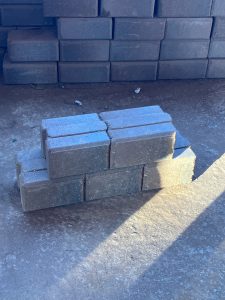 The factory is impressive, producing 1,000 small blocks daily. However, Peter mentioned some challenges they face due to the manpower needed for operations. He expressed that a more mechanized process could significantly ease their workload.
The factory is impressive, producing 1,000 small blocks daily. However, Peter mentioned some challenges they face due to the manpower needed for operations. He expressed that a more mechanized process could significantly ease their workload.
Currently, the plant employs 12 staff members and runs on a generator, though they expect to have electricity soon, as they’ve already applied and made the necessary payments.
Entry #3 – Thursday, October 24th – Building homes, Empowering lives
Today we visited Namchides village which was Wiped away by cyclone Freddy in 2023.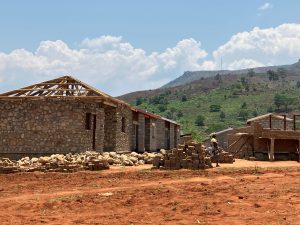
The Chief told us that 96 households were ravaged by the cyclone including his. He was found hanging from a tree. On March 11, the rain started, and on March 13, around 10 PM the mountains started making noise. A Few minutes later, the houses were flooding and floating away. The river, which is born at Mount Mulanje, was diverted to the village.
The village lost two farms, their main source of income and economic stability.
Several organizations have provided support to the village but habitat has been the constant visitor and is now building their new homes.
The road still needs to be rehabilitated so the village can continue their economic activity.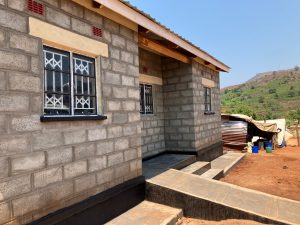
Habitat is also offering psycho-social support to the villagers since so many have some form of trauma as a result of the cyclone.
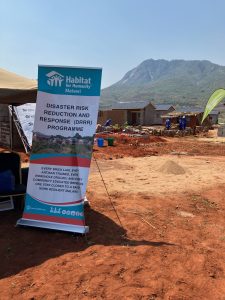 Habitat’s DRRR program is overseeing the reconstruction in this village. The disaster risk reduction and response (DRRR) program looks to reduce vulnerabilities to disasters. Habitat started interventions in this village last year and they are expected to be completed in December. All Donations are being funneled into a common cyclone Freddy fund.
Habitat’s DRRR program is overseeing the reconstruction in this village. The disaster risk reduction and response (DRRR) program looks to reduce vulnerabilities to disasters. Habitat started interventions in this village last year and they are expected to be completed in December. All Donations are being funneled into a common cyclone Freddy fund.
Total reconstruction funding is for 48 homes which leaves a deficit of 38. Habitat also Safeguards the housing and do land tenure exercises for families to be able to claim ownership of the land in court. So far, 38 families and 23 leaders have trained in property rights and wills and inheritance.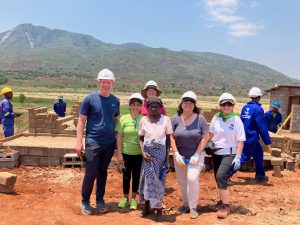
49 local artisans have been trained in safe house construction as Malawi is prone to disasters. Artisans from this area are trained and given startup kits as well as employment during the build of these houses.
230 families have been trained in building back better to allow communities to identify their own potential without requiring external support.
Additionally, 17 youth from vulnerable partner families were trained in motorcycle mechanics, construction, etc. To provide a source of income.
Each home costa approximately $10,000 to build.
One of the resident’s homes washed away and she rebuilt a tent using the remnants. She Looks after 7 children, some orphans some hers, some abandoned. At the end of this month, she will move in to her habitat home.
Habitat has done an assessment of the community and Priority is given to female headed households.
So far, 217 people are missing, and 151 died.
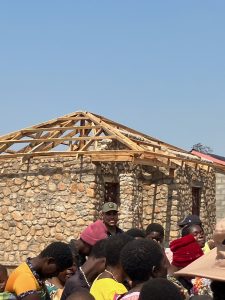 Last for the day, we toured Stemwa tea estates tea making factory and learned that all tea comes from the same plant, their names vary based on preparation. White tea is dried naturally, black tea is oxidized, and green tea is not oxidized. The plant employs 2500 people.
Last for the day, we toured Stemwa tea estates tea making factory and learned that all tea comes from the same plant, their names vary based on preparation. White tea is dried naturally, black tea is oxidized, and green tea is not oxidized. The plant employs 2500 people.
The Global Village cohort is working to provide education and advocacy for a bright future where these women-led families are safe and secure. Due to the imbalance of a patriarchal society, these women are determined to provide a better life for their children after many have dealt with the horrors of domestic violence and abuse. Habitat is helping to empower these women-led families and will continue to do so in the years to come.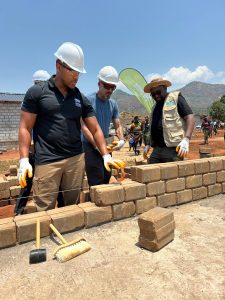
-Chris and Camilla
Day 4 – Finding Solutions and Hope
We visited the Nkhwazi rescue center in the flood prone Chikhawa district. The center was Created by Habitat for Humanity Malawi in response to cyclone Idai with Funding from Great Britain.
 Habitat conducted a Visibility study in areas that are prone to disaster in order to identify where to build rescue centers.
Habitat conducted a Visibility study in areas that are prone to disaster in order to identify where to build rescue centers.
The rescue center Provides a safe haven to the community during disasters. It is built up to be flood resistant. The center was Completed in 2021 and the village started using it in 2022 after Ana and Kenneth cyclones. It hosts 701 households separated by gender, a total of 2,000 and its roughly 4,500 sq. Feet. There are a total of 2780 people in the village. It currently has No sanitary facilities constructed as that’s all funding allowed for. This caused two deaths from cholera last year.
Illovo, Africa’s leading and diversified sugar group, just recently provided fresh water. The center doesn’t have electricity but ideally, a solar solution would be created for affordability purposes. The ministry of health offers Monthly clinics where contraceptives and under age 5 care, as well as HIV medicine are provided. Next year, the elections will be held here.
After lunch, we visited Majete Wildlife reserve and did a game drive where we saw elephants, hippos, and lots of antelope.
To conclude the week, the Habitat for Humanity Malawi team sat for dinner together with the tithe champions. Víctor, the ED at HFHM presented us with the areas of biggest need for the affiliate as well as the wins they had accomplished so far.
 HFH Malawi has 4 major programmatic areas, is present in 9 of 27 districts, and is focused on providing sustainable housing solutions. The affiliate has built 1787 homes in the last 10 years in both rural and urban communities. 13 homes have been constructed through the GV program, 4,000 people have been trained in housing and land rights, 2050 people have been served through land acquisition, surveying, and plot demarcation of informal settlements.
HFH Malawi has 4 major programmatic areas, is present in 9 of 27 districts, and is focused on providing sustainable housing solutions. The affiliate has built 1787 homes in the last 10 years in both rural and urban communities. 13 homes have been constructed through the GV program, 4,000 people have been trained in housing and land rights, 2050 people have been served through land acquisition, surveying, and plot demarcation of informal settlements.
In the past 2 years, the affiliate has drilled 10 boreholes for access to water and rehabilitated 20 providing access to 1920 households with water. In Malawi the cost of building a 3 bedroom home with latrine and bathroom is $8,500. The need: build 48 additional homes at Nanchidwa in Mulanje by 2025 – a total of $641,000; establish a solar village at Nanchidwa camp by 2025 – a cost of $85,000.
–Chris and Camila

